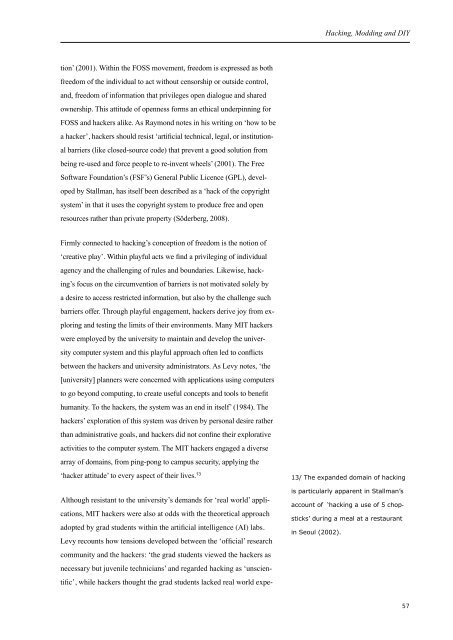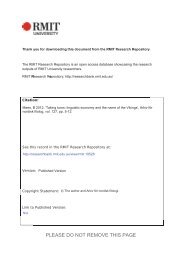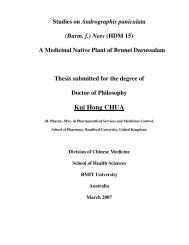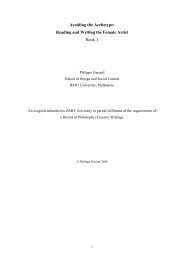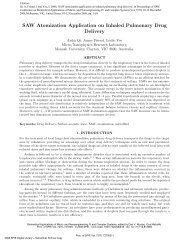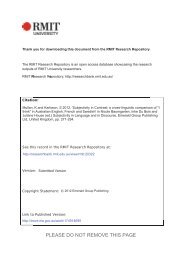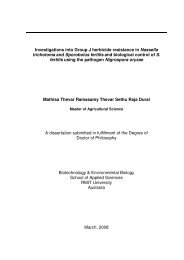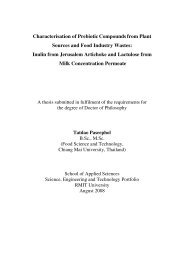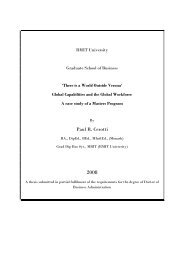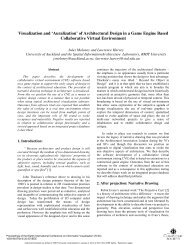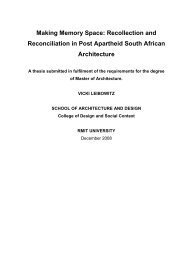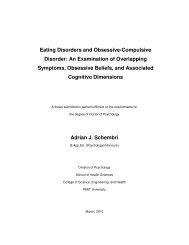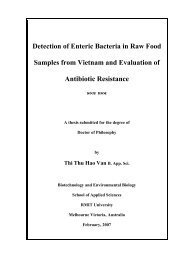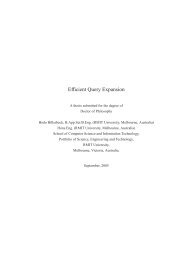Objects in Flux - RMIT Research Repository - RMIT University
Objects in Flux - RMIT Research Repository - RMIT University
Objects in Flux - RMIT Research Repository - RMIT University
You also want an ePaper? Increase the reach of your titles
YUMPU automatically turns print PDFs into web optimized ePapers that Google loves.
tion’ (2001). With<strong>in</strong> the FOSS movement, freedom is expressed as both<br />
freedom of the <strong>in</strong>dividual to act without censorship or outside control,<br />
and, freedom of <strong>in</strong>formation that privileges open dialogue and shared<br />
ownership. This attitude of openness forms an ethical underp<strong>in</strong>n<strong>in</strong>g for<br />
FOSS and hackers alike. As Raymond notes <strong>in</strong> his writ<strong>in</strong>g on ‘how to be<br />
a hacker’, hackers should resist ‘artificial technical, legal, or <strong>in</strong>stitutional<br />
barriers (like closed-source code) that prevent a good solution from<br />
be<strong>in</strong>g re-used and force people to re-<strong>in</strong>vent wheels’ (2001). The Free<br />
Software Foundation’s (FSF’s) General Public Licence (GPL), developed<br />
by Stallman, has itself been described as a ‘hack of the copyright<br />
system’ <strong>in</strong> that it uses the copyright system to produce free and open<br />
resources rather than private property (Söderberg, 2008).<br />
Firmly connected to hack<strong>in</strong>g’s conception of freedom is the notion of<br />
‘creative play’. With<strong>in</strong> playful acts we f<strong>in</strong>d a privileg<strong>in</strong>g of <strong>in</strong>dividual<br />
agency and the challeng<strong>in</strong>g of rules and boundaries. Likewise, hack<strong>in</strong>g’s<br />
focus on the circumvention of barriers is not motivated solely by<br />
a desire to access restricted <strong>in</strong>formation, but also by the challenge such<br />
barriers offer. Through playful engagement, hackers derive joy from explor<strong>in</strong>g<br />
and test<strong>in</strong>g the limits of their environments. Many MIT hackers<br />
were employed by the university to ma<strong>in</strong>ta<strong>in</strong> and develop the university<br />
computer system and this playful approach often led to conflicts<br />
between the hackers and university adm<strong>in</strong>istrators. As Levy notes, ‘the<br />
[university] planners were concerned with applications us<strong>in</strong>g computers<br />
to go beyond comput<strong>in</strong>g, to create useful concepts and tools to benefit<br />
humanity. To the hackers, the system was an end <strong>in</strong> itself’ (1984). The<br />
hackers’ exploration of this system was driven by personal desire rather<br />
than adm<strong>in</strong>istrative goals, and hackers did not conf<strong>in</strong>e their explorative<br />
activities to the computer system. The MIT hackers engaged a diverse<br />
array of doma<strong>in</strong>s, from p<strong>in</strong>g-pong to campus security, apply<strong>in</strong>g the<br />
‘hacker attitude’ to every aspect of their lives. 13<br />
Although resistant to the university’s demands for ‘real world’ applications,<br />
MIT hackers were also at odds with the theoretical approach<br />
adopted by grad students with<strong>in</strong> the artificial <strong>in</strong>telligence (AI) labs.<br />
Levy recounts how tensions developed between the ‘official’ research<br />
community and the hackers: ‘the grad students viewed the hackers as<br />
necessary but juvenile technicians’ and regarded hack<strong>in</strong>g as ‘unscientific’,<br />
while hackers thought the grad students lacked real world expe-<br />
Hack<strong>in</strong>g, Modd<strong>in</strong>g and DIY<br />
13/ The expanded doma<strong>in</strong> of hack<strong>in</strong>g<br />
is particularly apparent <strong>in</strong> Stallman’s<br />
account of ‘hack<strong>in</strong>g a use of 5 chop-<br />
sticks’ dur<strong>in</strong>g a meal at a restaurant<br />
<strong>in</strong> Seoul (2002).<br />
57


